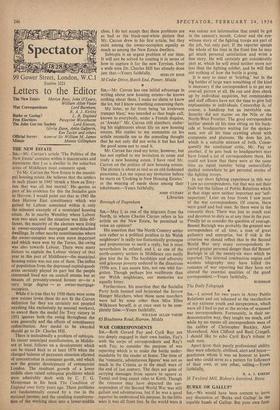Letters to the Editor
The New Estate Merlyn Rees, John O'Leary,
William Allan Pause
War Correspondents Lord Burnham,
R. A. J. Kirkby
Burke or Gallup? L. R. England Free Elections Peregrine Worsthome The John Gorion Society Lord Kinross,
Gloria Dunn, Anita Galperin, Ken Taylor and others
Official Secret- Admiral Sir William M. James Minnie Minnie Gillingham
THE NEW ESTATE SIR,—Mr. Curran's article 'The Politics of the New Estate' contains within it inaccuracies and statements that I as a dweller in the suburban areas of M iddlesex must comment upon.
To Mr. Curran the New Estate is the munici- pal housing estate. He believes that the settlers in such places in 1945 'struck a blow at Tory- ism that was all but mortal' He quotes as part of his evidence for this the Socialist gain in Harrow. I would point out that in .1945 the then Harrow East constituency which was gained by Labour contained within it only the minutest example of a municipal housing estate. As in nearby Wembley where Labour won two seats and the situation was little dif- ferent, the majority of the electors were living in owner-occupied mortgaged semi-detached dwellings. In other nearby constituencies where the owner-occupier was even more important and which were won by the Tories, the swing was also towards Labour. There were many factors to explain the Labour victory of that year in this part of Middlesex—the municipal housing estate was not one of them. The influx of population from the depressed capital-goods areas certainly played its part but the people concerned lived not on council estates but as tenants of privately-owned houses or—to a very large degree — as owner-mortgage- occupiers.
While it is true that by 1950 there were some new estates (even these do not fit the Curran definition for they are certainly not peopled anything like exclusively by manual workers), to award them the medal for Tory victory in 1951 ignores both•the swing throughout the area generally and the effects of constituency redistribution. Any medal to be awarded should go to Dr. Charles Hill.
There is undoubtedly a problem of subtopia. Its recent municipal manifestation, in Middle- sex at least, follows on a development which can be traced back to at least 1870 when the changed balance of payments situation allowed of concentration in consumer goods, and which saw the greater development of commercial London. The resultant growth of a lower middle class raised subtopian problems which were admirably dealt with by C. F. G. Masterman in his book The Condition of England over forty years ago. These problems are fundamentally caused by a rise in the national income, and the resulting transforma- tion of the working class into a lower-middle
class. I do not accept that these problems are as bad as the black-and-white picture that Mr. Curran drew in his first article, but they exist among the owner-occupiers equally as much as among the New Estate dwellers.
Subtopia is an urgent problem of our time. It will not be solved by treating it in terms of how to capture it for the new Toryism. Over a wide area Dr. Charles Hill has already done just that.—Yours faithfully, MERLYN REES 50 Cedar Drive, Hatch End, Pinner, Middx


































 Previous page
Previous page